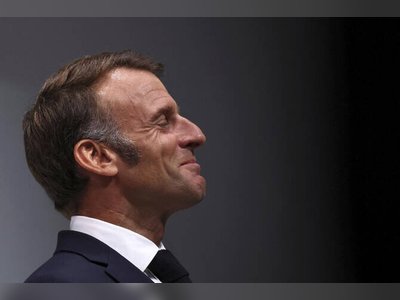
European Elections: Millions Vote Amid Far-Right Surge and Uncertainty
On Sunday, May 26, 2019, tens of millions of voters across Europe, including in heavy-hitting countries like France and Germany, participated in the final day of elections for the European Union (EU) parliament.
Far-right parties were aiming for gains during this pivotal time for the bloc.
The election, which helps determine the EU's direction for the next five years, comes as Europe faces challenges such as Russia's war in Ukraine, global trade tensions, a climate emergency, and potential changes in the West due to a new US presidency.
Voters expressed the importance of standing up for peace and democracy amidst uncertainty.
A 40-year-old individual expressed understanding for people's fear and rigid voting in the European Union (EU) elections.
Over 360 million people were eligible to vote in the four-day election, but turnout is historically low.
The next EU parliament will determine who leads the European Commission, with Ursula von der Leyen, a German conservative, seeking re-election.
Centrist parties are predicted to lose seats to a stronger far-right, pushing the bloc towards ultraconservatism.
Preliminary results are expected late Sunday.
European voters are influenced by high living costs and fear of immigrants, making them receptive to populist messaging.
Marine Le Pen's far-right National Rally (RN) is predicted to win the upcoming French elections with over 30% of the votes, significantly surpassing President Emmanuel Macron's liberal Renaissance party, which is polling around half that.
Le Pen voted in Henin-Beaumont without making any comments to the media.
Some French voters, like Albert Coulaudon in Lyon, are concerned about Macron's involvement in international issues, such as the war in Ukraine.
In contrast, Martine Dorian in Toulouse believes that the disappearance of Europe would mean the end of France.
The German elections could also negatively impact Chancellor Olaf Scholz, who received support from voters while casting his ballot.
In the European elections, Germany's opposition center-right Christian Democrats are leading with a projected 30% of votes, while the far-right Alternative for Germany (AfD) is neck-and-neck or ahead of the ruling coalition parties: SPD, Greens, and liberal FDP. In Italy, the far-right Brothers of Italy party, led by Prime Minister Giorgia Meloni, is expected to win the elections.
Meloni is being courted by EU leaders, including von der Leyen, for her backing in the second mandate, as well as Le Pen and Hungarian Prime Minister Viktor Orban, who aim to form a far-right parliament supergroup.
Meloni aligns with the EU consensus on maintaining military and financial assistance to Ukraine, unlike Le Pen.
In EU countries closest to Russia, the threat from Russia looms large.
Ieva Sterlinge, a doctor from Lithuania, and Teodora Maia, a psychologist from Romania, expressed concerns about security, particularly for the Baltic states and the ongoing war in Ukraine, as reasons for their votes.
In contrast, Ferenc Hamori, a Hungarian voter, expressed support for Hungarian leader Viktor Orban's close relations with Russian President Vladimir Putin and wanted more leaders like him in the EU.
Orban framed the election as a "pro-peace or pro-war election" and has previously stoked fears of the Ukraine war expanding into a conflict between the West and Russia, blaming Brussels and NATO for the tension.
Hungarian Prime Minister Viktor Orban is facing opposition from former government insider Peter Magyar during the European Parliament elections.
According to polling data by Politico, the European People's Party (EPP), which Orban is a part of, is projected to win the most seats with 173.
The center-left Socialists and Democrats are predicted to win 143 seats, and the centrist Renew Europe grouping is expected to get 75 seats.
The main far-right grouping, European Conservatives and Reformists, including Matteo Salvini's Brothers of Italy party, is projected to win 76 seats, while the smaller Identity and Democracy grouping, which includes Marine Le Pen's RN, is predicted to get 67 seats.
Orban is facing backlash at home despite these projections.
The election, which helps determine the EU's direction for the next five years, comes as Europe faces challenges such as Russia's war in Ukraine, global trade tensions, a climate emergency, and potential changes in the West due to a new US presidency.
Voters expressed the importance of standing up for peace and democracy amidst uncertainty.
A 40-year-old individual expressed understanding for people's fear and rigid voting in the European Union (EU) elections.
Over 360 million people were eligible to vote in the four-day election, but turnout is historically low.
The next EU parliament will determine who leads the European Commission, with Ursula von der Leyen, a German conservative, seeking re-election.
Centrist parties are predicted to lose seats to a stronger far-right, pushing the bloc towards ultraconservatism.
Preliminary results are expected late Sunday.
European voters are influenced by high living costs and fear of immigrants, making them receptive to populist messaging.
Marine Le Pen's far-right National Rally (RN) is predicted to win the upcoming French elections with over 30% of the votes, significantly surpassing President Emmanuel Macron's liberal Renaissance party, which is polling around half that.
Le Pen voted in Henin-Beaumont without making any comments to the media.
Some French voters, like Albert Coulaudon in Lyon, are concerned about Macron's involvement in international issues, such as the war in Ukraine.
In contrast, Martine Dorian in Toulouse believes that the disappearance of Europe would mean the end of France.
The German elections could also negatively impact Chancellor Olaf Scholz, who received support from voters while casting his ballot.
In the European elections, Germany's opposition center-right Christian Democrats are leading with a projected 30% of votes, while the far-right Alternative for Germany (AfD) is neck-and-neck or ahead of the ruling coalition parties: SPD, Greens, and liberal FDP. In Italy, the far-right Brothers of Italy party, led by Prime Minister Giorgia Meloni, is expected to win the elections.
Meloni is being courted by EU leaders, including von der Leyen, for her backing in the second mandate, as well as Le Pen and Hungarian Prime Minister Viktor Orban, who aim to form a far-right parliament supergroup.
Meloni aligns with the EU consensus on maintaining military and financial assistance to Ukraine, unlike Le Pen.
In EU countries closest to Russia, the threat from Russia looms large.
Ieva Sterlinge, a doctor from Lithuania, and Teodora Maia, a psychologist from Romania, expressed concerns about security, particularly for the Baltic states and the ongoing war in Ukraine, as reasons for their votes.
In contrast, Ferenc Hamori, a Hungarian voter, expressed support for Hungarian leader Viktor Orban's close relations with Russian President Vladimir Putin and wanted more leaders like him in the EU.
Orban framed the election as a "pro-peace or pro-war election" and has previously stoked fears of the Ukraine war expanding into a conflict between the West and Russia, blaming Brussels and NATO for the tension.
Hungarian Prime Minister Viktor Orban is facing opposition from former government insider Peter Magyar during the European Parliament elections.
According to polling data by Politico, the European People's Party (EPP), which Orban is a part of, is projected to win the most seats with 173.
The center-left Socialists and Democrats are predicted to win 143 seats, and the centrist Renew Europe grouping is expected to get 75 seats.
The main far-right grouping, European Conservatives and Reformists, including Matteo Salvini's Brothers of Italy party, is projected to win 76 seats, while the smaller Identity and Democracy grouping, which includes Marine Le Pen's RN, is predicted to get 67 seats.
Orban is facing backlash at home despite these projections.
Translation:
Translated by AI











